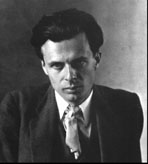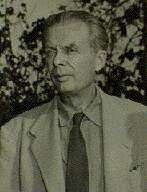Aldous Huxley
 The English novelist and essayist Aldous Leonard Huxley, b. July 26, 1894, d. Nov. 22,
1963, a member of a distinguished scientific and literary family. His mother's death from cancer when he was 14, he said
later, gave him a sense of the transience of human happiness. He intended to study medicine
but was prevented by an eye ailment that almost blinded him at the age of 16. He then turned
to literature, publishing two volumes of poetry while still a student at Oxford.
During the First World War he was a conscientous objector (he was a lifelong pacifist) and his intellectual estrangement from mainstream society which this endengered increased as he grew older. He married Maria Nys, a Belgian, in
1919. Their only child, Matthew Huxley, was born in 1920. The family divided their time between
London and Europe, mostly Italy, in the 1920s, and traveled around the world in 1925 and 1926, seeing
India and making a first visit to the United States.
The English novelist and essayist Aldous Leonard Huxley, b. July 26, 1894, d. Nov. 22,
1963, a member of a distinguished scientific and literary family. His mother's death from cancer when he was 14, he said
later, gave him a sense of the transience of human happiness. He intended to study medicine
but was prevented by an eye ailment that almost blinded him at the age of 16. He then turned
to literature, publishing two volumes of poetry while still a student at Oxford.
During the First World War he was a conscientous objector (he was a lifelong pacifist) and his intellectual estrangement from mainstream society which this endengered increased as he grew older. He married Maria Nys, a Belgian, in
1919. Their only child, Matthew Huxley, was born in 1920. The family divided their time between
London and Europe, mostly Italy, in the 1920s, and traveled around the world in 1925 and 1926, seeing
India and making a first visit to the United States.
His early literary reputation was based on a series of satires he wrote in the 1920's. In both fiction and nonfiction Huxley became increasingly critical of Western civilization in the 1930s. Brave New World (1932), his most celebrated work, is a bitterly satiric account of an inhumane society controlled by technology. Art has been abolished and religion replaced by worship of the machine, and humans reproduce by artificial fertilization. This novel was written before the rise of the Nazis or a general acceptance by "intellectuals" of the horror of the communist regime in the USSR.
He was heavily involved in the Pacifist Crusades of the the 1930's, work which was most helpful to the Nazi regime and helped produce the political malaise that contributed to the Second World War. In 1937, the Huxleys came to the United States; in 1938 they went to Hollywood, where he became a screenwriter (among his films was an adaptation of Jane Austen's Pride and Prejudice, which starred the young Laurence Olivier and a dazzling Greer Garson).
Huxley's distress at what he regarded as the spiritual bankruptcy of the modern world led him toward mysticism and the use of hallucinatory drugs. The novel Eyeless in Gaza (1936) portrays its central character's conversion from selfish isolation to transcendental mysticism. This intellectual conversion was mainly influenced by his friend Gerald Heard, an Irish homosexual author, who had moved to California and commenced various groups based on meditation and this ideology that were never successful. The 'Perennial Philosophy' was the fullest exposition of Huxley's beliefs, unfortunately these beliefs only exacerbated the gulf between his metaphysical beliefs and his actual day to day existence. In The Doors of Perception (1954) and Heaven and Hell (1956) he describes the use of mescaline to induce visionary states. Another work centering on drugs and sanity was Island (1962), a novel that required 20 years of thought and five years of writing and makes Huxley's Utopia sound as boring and didactic as his writing.
 Apart from 'Brave New World' little of his fiction is still read or appears to be able to stand the test of time. He is portrayed as the great intellectual sage, literary saint and elder statesman of the 'New Age' by those who believe in mystical experiences and/or the use of hallucinogenic drugs as a valid spiritual path and it is for this reason that I have included him here as a 'guru'. A close examination of his life reveals a different story.
Apart from 'Brave New World' little of his fiction is still read or appears to be able to stand the test of time. He is portrayed as the great intellectual sage, literary saint and elder statesman of the 'New Age' by those who believe in mystical experiences and/or the use of hallucinogenic drugs as a valid spiritual path and it is for this reason that I have included him here as a 'guru'. A close examination of his life reveals a different story.
He suffered a nervous breakdown and severe clinical depression in 1937.
Huxley lacked commonsense and discrimination, the ability to separate meaningful ideas and attitudes from worthless ones. This is highlighted in the oft-repeated tale of his grapples with conscience when he was offered the job of screen writer for Pride and Prejudice in August, 1939 with M.G.M. Though he needed the money, he could not accept now that the war was on. How could he solve this moral conundrum, he had consulted his good friend Krishnamurti but he was unable to come to a morally acceptable solution. Fortunately among his friends was the author of 'Gentlemen Prefer Blondes', Anita Loos, who he phoned with his wife Maria on another extension. She wanted to know why he couldn't accept the job. "Because it pays fifteen-hundred dollars a week. I simply cannot accept all that money to work in a … studio while my family and friends are starving and being bombed in England." "But Aldous", she replied, "why can't you accept that fifteen-hundred dollars and send the larger part of it to England?" There was a long silence at the other end of the line, and then Maria spoke up. "Anita," she said, "what would we ever do without you?"
Huxley's personal beliefs are at the forefront of all his writings from the mid 1930's on (didactic is the best thing that can be said of their style) but were most fully expounded in the 'Perennial Philosphy'. The following is a quote from a letter of his wife's describing him at this time:
I fear that for the whole of his life he will never be really well. I don't think he'll even mind. He is more and more absorbed by his books and ideas. And a nice walk once a day. He doesn't even notice that he hasn't used his hands or his body for the last two or three years. The slightest effort, the slightest change in routine brings about a relapse, depression, fatigue. The one thing that consoles me is that it doesn't seem to bother him. He isn't quite aware of it, I think. It is discouraging for me - I felt very sad the other day when I had realized it might be like this for ever …"
And this is one from a letter of his:
"Whereas I have always tended to be somewhere else, in a world of analysis, unfavourable equally to Micawberish living, Tolstoyan art and contemplative spirituality. The title of my first book … Limbo, was, now I see, oddly prophetic!"
His philosophy, which he hoped to turn into an experience of life, was that the experiences of the relatively tiny number of people who in history had claimed to have an experience usually called mysticism - not to be confused with occult magic - was an underlying proof of a commmon truth underlying the various religions of the world. Why this experience should have priority over all others is to be taken on faith or belief, there is no a priori reason to accept a very uncommon experience that has no necessary connection with religious beliefs or moral and ethical values.
Huxley and his friends in California had regular Tuesday night seances though the information from these was as worthless as most. While trying to appear the skeptical man of science he was open to any fortune-teller, clairvoyant or quack. He moved house frequently, usually on the spur of the moment, without adequte consultation and usually into houses that proved to be inadequate, requiring maintenance or so badly sited that they exacerbated his continual hay fever. His understanding of others was so poor that he had no idea his first wife of thirty years marriage was dying of cancer until he was finally told 7 days before she died. His wife's opinion of him can be gleaned from the fact that she didn't want him to know until the very end.
Two years later he remarried without ever telling a single member of his family or any friends either of his plans or even of his future wife. For most of his career he wasted much time and effort trying to convert some his books to plays though evidence suggested he had no talent in this area. One smash hit would solve all his financial problems in one go and after this carrot he dangled.
In 1956 he wrote in a letter to his brother Julian, the director of UNESCO, on international affairs:
"Asians and Africans do not forget and are so far from forgiving that, if they can thereby do some harm to the ex-imperialists, they will blithely damage themselves, even commit suicide. If I can spite your face I will cut off my nose. There is no appeal to these passions even to self interest. … If I remember rightly, Nostrodamus prophesied that in the year 2000 or thereabouts, yellow men would be flying over Paris. It may easily turn out that he was right."
Of course many Asians (they don't look yellow to me, but I think that's to whom he was referring) now jet over Paris to holiday in Europe but that's not what Aldous meant. He was deeply pessimistic about the world future because he didn't accept that human society can go on improving a bit at a time, solving problems as they arise. He believed he knew the big answers to the big questions and as most humans didn't accept his wisdom, they were doomed.
He is the eminence grise of the proponents of the drug culture, Watts, Ginsberg, Leary et al.
Bibliography:
Bedford, Sybille, Aldous Huxley (1985)
Dunaway, David K., Huxley in Hollywood (1989; repr. 1991)
Ferns, C. S., Aldous Huxley (1980)
Firchow, Peter, The End of Utopia (1984)
Kuehn, Robert, ed., Aldous Huxley: A Collection of Critical Essays (1974)
Nance, G. A., Aldous Huxley (1988)
Wyatt, Donald, Aldous Huxley (1985).